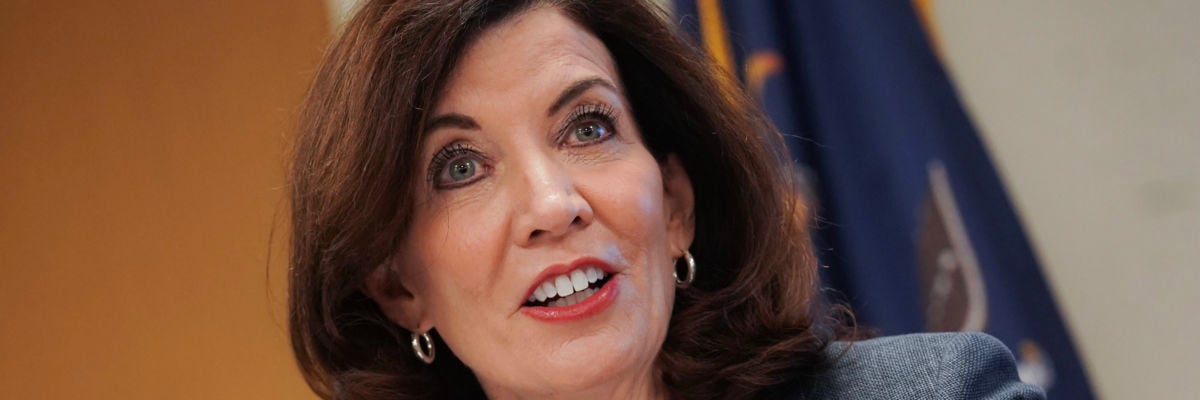
In a recent piece in Catholic World Report, George Weigel mentioned how, “when challenged on how she squares her pro-abortion radicalism with her Catholicism,” New York governor Kathy Hochul “has been known to reply, ‘I’m a Matthew 25 Catholic.’” She’s not alone. Congressman Ted Lieu (D-Calif.), perhaps best known for “daring” the Catholic Church to deny him Communion (warning: gross misunderstanding of Catholic Eucharistic theology at the link) for his vocal support for contraception, abortion, and same-sex marriage, also likes to brand himself a “Matthew 25 Catholic.”
In one sense, every one of us should be a Matthew 25 Catholic, because it’s in the twenty-fifth chapter of Matthew that Christ foretells how he will come again in glory to judge “all the nations, and he will separate them one from another as a shepherd separates the sheep from the goats, and he will place the sheep at his right hand, but the goats at the left” (Matt. 25:32-33). Christ says to those who feed the hungry, give drink to the thirsty, welcome the stranger, clothe the naked, visit the sick, and go to the prisoner that “as you did it to one of the least of these my brethren, you did it to me,” ushering them into eternal life (vv. 34-40). Those who were indifferent to the hungry, thirsty, stranger, naked, sick, and prisoners are instead told, “Depart from me, you cursed, into the eternal fire prepared for the devil and his angels” (vv. 41-46). It’s not enough to believe that Jesus is who he says he is if our actions don’t match our words.
As Pope John Paul II points out in Evangelium Vitae, Christ in Matthew 25 “asks to be loved and served in his brothers and sisters who are suffering in any way: the hungry, the thirsty, the foreigner, the naked, the sick, the imprisoned. . . . Whatever is done to each of them is done to Christ himself.” But the pope then adds that “human life finds itself most vulnerable when it enters the world and when it leaves the realm of time to embark upon eternity.” That is, the horrors of abortion and euthanasia are precisely that they are attacks on “the least of these,” the most vulnerable members of the human family. The unborn baby “is weak, defenseless, even to the point of lacking that minimal form of defense consisting in the poignant power of a newborn baby’s cries and tears.”
This is the horrible irony of Hochul and Lieu invoking Matthew 25: it pronounces a judgment of damnation even on those who are indifferent to the “least of these,” a category that emphatically includes the unborn. It would be hard to envision a law more antithetical to Matthew 25 than one that legalizes murdering defenseless members of society. In John Paul II’s words, “laws which legitimize the direct killing of innocent human beings through abortion or euthanasia are in complete opposition to the inviolable right to life proper to every individual; they thus deny the equality of everyone before the law.”
This is why it’s not enough for a legislator (or a citizen) to simply be “personally opposed” to abortion. Laws that treat one segment of society as the property of another are gross violations of human rights, whether we’re talking about slavery or abortion. So are laws that permit one segment of society to kill another segment of society with impunity, whether we’re talking about abortion or genocide.
Abortion and euthanasia are “crimes which no human law can claim to legitimize.” John Paul II warned that “in the case of an intrinsically unjust law, such as a law permitting abortion or euthanasia, it is therefore never licit to obey it, or to ‘take part in a propaganda campaign in favor of such a law, or vote for it.’”
This should be sufficient to answer those who argue that it’s enough to aim to reduce the number of abortions, rather than seeking to outlaw abortion. The choice is a false one. Part of the fight against abortion necessarily includes the fight to see abortion outlawed. In the pope’s words, “if charity is to be realistic and effective, it demands that the gospel of life be implemented also by means of certain forms of social activity and commitment in the political field, as a way of defending and promoting the value of life in our ever more complex and pluralistic societies.” After all,
although laws are not the only means of protecting human life, nevertheless they do play a very important and sometimes decisive role in influencing patterns of thought and behavior. I repeat once more that a law which violates an innocent person’s natural right to life is unjust and, as such, is not valid as a law. For this reason I urgently appeal once more to all political leaders not to pass laws which, by disregarding the dignity of the person, undermine the very fabric of society.
We see this “decisive role” in shaping hearts and minds by looking at slavery, an issue like abortion. As recently as 1856, abolitionism was a minority position in the United States. Pro-abolition presidential candidate John C. Fremont came in a distant second to James Buchanan, who positioned himself as a moderate on the question. In his inaugural address, Buchanan criticized the fight over slavery as having produced “no positive good to any human being” and openly longed for the day when “the public mind shall be diverted from this question to others of more pressing and practical importance.” Even on the eve of the Civil War, in his final State of the Union address, Buchanan was still criticizing “the long-continued and intemperate interference of the Northern people with the question of slavery in the Southern States,” and talking about “how easy it would be for the American people to settle the slavery question forever and to restore peace and harmony to this distracted country,” if only slave states could be “let alone and permitted to manage their domestic institutions in their own way.” How dare Northerners try to impose their personal morality on Southern slaveowners?
Buchanan’s views were perfectly mainstream during his lifetime. These days, he’s remembered not as a sober moderate, but as the worst president in American history. His position, that “slaves are property, and, like all other property, their owners have a right to take them into the common Territories and hold them there under the protection of the Constitution,” isn’t moderate at all: it’s beyond the scope of even the most extreme elected officials. What changed? The law. After slavery was outlawed for a sufficiently-long time, it gradually became unthinkable. We can see the same thing with any number of societal evils: outlawing them doesn’t eradicate them overnight, but it does help to change hearts and minds.
But the fight to see abortion outlawed is only part of the pro-life battle. John Paul II warns that “a general and no less serious responsibility” for abortion lies with those “who should have ensured—but did not—effective family and social policies in support of families, especially larger families and those with particular financial and educational needs.” It shouldn’t be this hard to raise a family, and our indifference to expectant mothers in crisis is morally culpable. In John Paul II’s vision, this requires a serious rethinking of our social structures:
The underlying causes of attacks on life have to be eliminated, especially by ensuring proper support for families and motherhood. A family policy must be the basis and driving force of all social policies. For this reason there need to be set in place social and political initiatives capable of guaranteeing conditions of true freedom of choice in matters of parenthood. It is also necessary to rethink labor, urban, residential and social service policies so as to harmonize working schedules with time available for the family, so that it becomes effectively possible to take care of children and the elderly.
So what does it look like to truly be a “Matthew 25 Catholic”? It means personally and politically working to create better conditions for “the least of these” . . . including unborn children.
Image: Gov. Kathy Hochul of New York. Credit: Metropolitan Transportation Authority of the State of New York via Flickr, CC BY 2.0.



